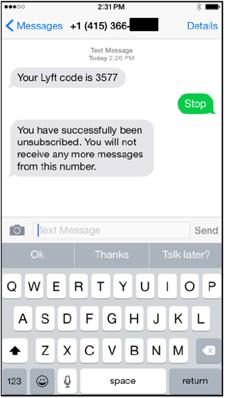 Ride-sharing
company Lyft violates the Telephone Consumer Protection Act by requiring consumers to receive marketing messages as a condition of using the service, the Federal Communications Commission said on
Friday.
Ride-sharing
company Lyft violates the Telephone Consumer Protection Act by requiring consumers to receive marketing messages as a condition of using the service, the Federal Communications Commission said on
Friday.
The FCC ordered the ride-sharing service to revise its practices, adding that failure to do so could result in fines.
The Telephone Consumer Protection Act prohibits companies
from using automated dialers to send text messages to users without their consent. The FCC's rules implementing that law also prohibit companies from compelling consumers to accept autodialed calls or
texts as a condition of service.
"The evidence shows that Lyft's opt-out representations are illusory in nature, and Lyft effectively requires all consumers to agree to receive marketing text
messages and calls on their mobile phones in order to use services," the agency's enforcement bureau alleges in a citation
order.
advertisement
advertisement
The agency took action after a staff investigation revealed that Lyft wouldn't provide security codes, which are necessary for rides, to users who opt out of receiving SMS ads and
other messages. "In reality, there is no way to refuse consent to receive promotional messages without precluding use of Lyft’s services," the FCC writes.
The agency also issued a
citation to First National Bank for allegedly requiring online banking and Apple Pay customers to agree to receive SMS texts.
“Consumers have the right to choose whether they want
marketing calls and texts to their cell phones,” FCC Enforcement Bureau head Travis LeBlanc said in a statement. "We urge any company that unlawfully conditions its service on consent to
unwanted marketing calls and texts to act swiftly to change its policies.”
The FCC's move comes several months after it warned PayPal that a planned change to its terms of service would
run afoul of the Telephone Consumer Protection Act.
This spring, PayPal unveiled a new user agreement that required consumers to consent to receiving robocalls or automated texts as a
condition of using the service. After that provision drew attention, the company said that people could opt out of receiving robocalls and texts by logging into their accounts and contacting customer
service.
But the FCC warned PayPal in June that forcing people to agree to receive robocalls or texts -- even if they can later opt out -- violates the law. PayPal responded by revising its terms to terms to clarify that consumers need not agree to receive autodialed calls or SMS ads.